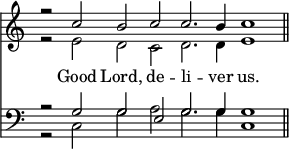first instance, derived. There are, in truth, grave difficulties in the way of forming any decided opinion upon the subject. Were the weakness of an unpractised hand anywhere discernible in the counterpoint of the later composition, one might well reject it as an 'arrangement': but it would be absurd to suppose that any Musician capable of deducing the five-part Response, 'Good Lord, deliver us,' from that in four parts, would have condescended to build his work upon another man's foundation.
| From the 4-part Litany. | From the 5-part Litany. |
 |
 |
The next Response, 'We beseech Thee to hear us, Good Lord,' presents a still more serious crux. The Canto fermo of this differs so widely from any known version of the Plain Chaunt melody that we are compelled to regard the entire Response as an original composition. Now, so far as the Cantus, and Bassus, are concerned, the two Litanies correspond, at this point, exactly: but, setting all prejudices aside, and admitting the third chord in the 'Clifford MS.' to be a manifest lapsus calami, we have no choice but to confess, that, with respect to the mean voices, the advantage lies entirely on the side of the five-part harmony. Surely, the writer of this could—and would—have composed a Treble and Bass for himself!
From the 'Clifford MS.'

From the Five-part Litany.

The difficulties we have pointed out with regard to these two Responses apply, with scarcely diminished force, to all the rest: and, the more closely we investigate the internal evidence afforded by the double text, the more certainly shall we be driven to the only conclusion deducible from it; namely, that Tallis has left us two Litanies, one for four voices, and the other for five, both founded on the same Plain Chaunt, and both harmonised on the same Basses, though developed, in other respects, in accordance with the promptings of two totally distinct ideas.
The four-part Litany has never, we believe, been published in a separate form. The best edition of that in five parts is, undoubtedly, Dr. Boyce's; though Messrs. Oliphant, and John Bishop, have done good service, in their respective reprints, by adapting, to the music of the Preces, those 'latter Suffrages,' which, having no place in the First Prayer-Book of King Edward VI, were not set by any of the old Composers. Some later editions, in which an attempt has been made at 'restoration,' have, it is to be feared, only resulted in depraving the original text to a degree previously unknown.
[ W. S. R. ]
LITOLFF, Henry Charles, was born in London Feb. 6, 1818. His father, a French Alsatian soldier taken prisoner by the English in the Peninsular War, had settled in London as a violinist after the declaration of peace, and had married an Englishwoman. In the beginning of the year 1831 Henry Litolff was brought by his father to Moscheles, who on hearing the boy play was so much struck by his unusual talent, that he offered to take him gratis as a pupil; and under his generous care Litolff studied for several years. He made his first appearance (or one of his first) at Covent Garden Theatre July 24, 1832, as 'a pupil of Moscheles, 12 years of age.' In his 17th year a marriage of which the parents disapproved obliged him to leave England and settle for a time in France. For several years after this event Litolff led a wandering life, and during this period he visited Paris, Brussels, Leipzig, Prague, Dresden, Berlin, and Amsterdam, giving in these towns a series of very successful concerts. In 1851 he went to Brunswick, and undertook there the business of the late music-publisher Meyer. In 1860 he transferred this business to his adopted son, Theodor Litolff, and he, in 1861, started the well-known 'Collection Litolff,' as a cheap and accurate edition of classical music, which was among the earliest of the many series of similar size and aim now existing. It opened with the sonatas of Beethoven, Mozart, and Haydn (vols. 1–4). Henry Litolff himself went to Paris, where he has since resided.
As a pianist Litolff's rank is high; fire, passion, and brilliancy of execution were combined with thought and taste in his playing. Had it been also correct, it would have reached the highest excellence. In his works, however, there is great inequality; beautiful and poetic ideas are often marred by repetition and a want of order, and knowing what the author's true capacity is, the result is a feeling of disappointment. About 115 of his works, including several operas, have been published. Among the best of them may be reckoned some of his pianoforte pieces, such as the well-known 'Spinnlied,' a few of his overtures and his symphony-concertos, especially nos. 3,[1] 4, and 5; the latter are remarkable for their wealth of original ideas in harmony, melody, and rhythm, and for their beautiful instrumentation. [App. p.704 "Add that his opera 'Les Templiers' was produced at Brussels in January, 1886."]
[ A. H. W. ]
LIVERPOOL MUSICAL FESTIVALS. These have not taken place with regularity. The
- ↑ Played at the Crystal Palace, by Mr. Oscar Beringer, March 28, 1874.
